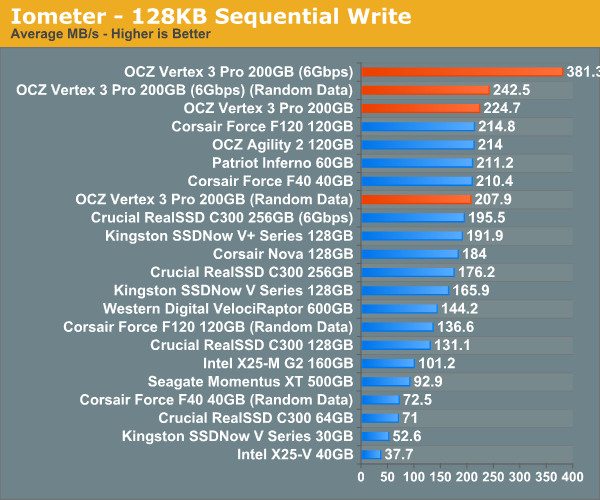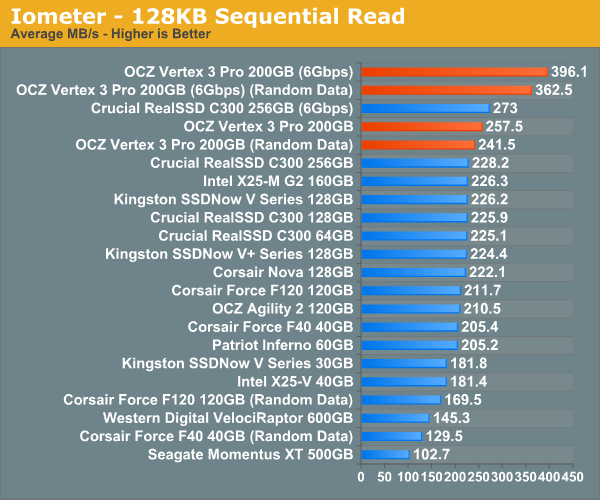OCZ Vertex 3 Pro Preview: The First SF-2500 SSD
by Anand Lal Shimpi on February 17, 2011 3:01 AM ESTSequential Read/Write Speed
To measure sequential performance I ran a 3 minute long 128KB sequential test over the entire span of the drive at a queue depth of 1. The results reported are in average MB/s over the entire test length.

This is pretty impressive. The new SF-2500 can write incompressible data sequentially at around the speed the SF-1200 could write highly compressible data. In other words, the Vertex 3 Pro at its slowest is as fast as the Vertex 2 is at its fastest. And that's just at 3Gbps.
The Vertex 3 Pro really shines when paired with a 6Gbps controller. At low queue depths you're looking at 381MB/s writes, from a single drive, with highly compressible data. Write incompressible data and you've still got the fastest SSD on the planet.
Micron is aiming for 260MB/s writes for the C400, which is independent of data type. If Micron can manage 260MB/s in sequential writes that will only give it a minor advantage over the worst case performance of the Vertex 3 Pro, and put it at a significant disadvantage compared to OCZ's best case.
Initially, SandForce appears to have significantly improved performance handling in the worst case of incompressible writes. While the old SF-1200 could only deliver 63% of its maximum performance when dealing with incompressible data, the SF-2500 holds on to 92% of it over a 3Gbps SATA interface. Remove the SATA bottleneck however and the performance difference returns to what we're used to. Over 6Gbps SATA the SF-2500 manages 63% of maximum performance if it's writing incompressible data.
Note that the peak 6Gbps sequential write figures jump up to around 500MB/s if you hit the drive with a heavier workload, which we'll see a bit later.

Sequential read performance continues to be dominated by OCZ and SandForce. Over a 3Gbps interface SandForce improved performance by 20 - 40%, but over a 6Gbps interface the jump is just huge. For incompressible data we're talking about nearly 400MB/s from a single drive. I don't believe you'd even be able to generate the workloads necessary to saturate a RAID-0 of two of these drives on a desktop system.










144 Comments
View All Comments
Slimline - Thursday, February 17, 2011 - link
This sounds interestingTrefugl - Thursday, February 17, 2011 - link
Indeed. I'm particularly liking the conclusion:'We're still a couple months away from knowing exactly what to buy, but if you've been putting off that move to an SSD - 2011 may be the year to finally pull the trigger"
That pretty much describes me perfectly. I do have an SSD in my work's workstation, but for home, but I've been holding out for 2011 (IMFT 25nm NAND) and I'm thinking I might not be disappointed by the wait.
Drag0nFire - Friday, February 18, 2011 - link
Indeed. I'm particularly excited to see what will happen when Intel shows up to the fight.MeanBruce - Friday, February 18, 2011 - link
Intel announced their 510 SSD G3 series today, it will come in 120Gb and 250Gb capacities, SATA3 6Gb/s, read/writes of 470Mb/s and 315Mb/s respect, and will be priced at $280 and $580! It's not using an Intel controller word is Intel doesn't have an in house controller with any real speed! SandForce is really shakin' things up! ;)MrBrownSound - Friday, February 18, 2011 - link
woah, no kidding. I'm looking forward to any reviews of it.MeanBruce - Saturday, February 19, 2011 - link
I knew when Intel pulled their G3 SSD lineup by rescheduling the release it had nothing to do with time constraints and everything to do with the numbers released shortly after by OCZ about their new SandForce controllers, 500/500 read/writes had Intel drawing up an entirely new gameplan for the new G3 lineup! But honestly I thought they would just let a little more magic out of the bag, I had no idea their bag was empty! Now I found out the new 510 series that becomes available March 1st is just going to use a Marvell controller just like the new Crucial and Corsair drives. I still love my X-25M but it's sad when a company with that many resources kicks back on their laurels. Oh well the good news is SandForce is here and with their new client Seagate we will have lots of choices and overall it's just great for the industry at large! Just sucks to watch the one time leader down so low!Out of Box Experience - Saturday, February 19, 2011 - link
Over 50% of the boxes on the Planet still run XPSo, the big question is...
Which one is XP compatible Out of the Box?
I'd love to buy a Sata 3 SSD that can saturate my XP Sata 2 ports but should we stick with Older/Slower Intel Sata 2 SSD's for compatibility??????
Any comment on this issue?
anactoraaron - Monday, February 21, 2011 - link
I know everyone has their own reason for keeping XP... but if you want to buy a $200+ SSD how can you not pony up the 100 for windows 7?Besides, 2 more years until XP is officially obsolete...
Out of Box Experience - Monday, February 21, 2011 - link
Bla bla blaHaving Windows 7 does not mean we all need to throw out our XP Licences and all our software that does not run on 7
Why can't somebody just answer my question instead of changing the subject
We get it! You love all the spyware and DRM built into Windows 7 but others don't
So lets just stick to the question I asked shall we?
Which Sata 3 SSDs will be Alignment agnostic at the very least so they can be used on ANY O.S. besides Spyware 7?
bennyg - Monday, February 21, 2011 - link
Bla bla bla spyware bla drm bla blaYou forgot to mention how locking DX10 to Vista/7 was a deliberate ploy to force gameplayers to upgrade.
And how Win7 is just Vista done right.
Far out some people hold grudges. I was ambivalent about Win7 when it was forced upon me - but for multicore + SSDs you just can't consider an old OS that wasn't designed when they were on the radar.